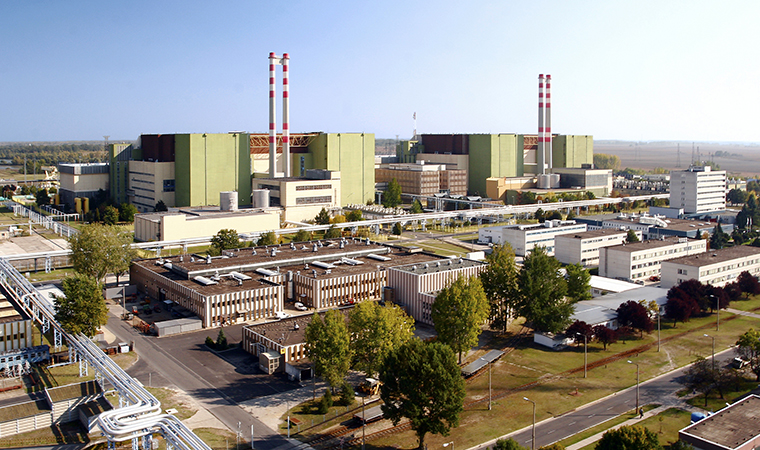
Confidence guarantee
back to contentsTVEL not simply provides the Hungarian NPP with high quality fuel, but also aspires to offer the customer the advanced technologies. So, Russian and Hungarian experts have recently developed and released a set of technical documentation to license new fuel for Paks NPP units. It will allow increase of electric power generation and reducing the cost of scheduled repair during refueling of Paks NPP units.
Ishtvan Hamvash, Paks NPP director, says that new fuel with increased enrichment (by Uranium-235) fabricated by Russian company TVEL will allow increasing the fuel cycle of Paks NPP units from 12 to 15 months.
“Due to the fact that we have such reliable foreign partners as MVM company and Paks NPP,” said Peter Lavrenyuk, TVEL vice-president, “We have the possibility to look more widely at all questions connected with development of fuel, to analyze global tendencies and to offer new ideas for implementation both in Russia and abroad. The task of further increase of Paks NPP fuel utilization efficiency is solved by means of implementation of new fuel with increased Uranium-235 enrichment and the advanced 15-months fuel cycle. The power system will operate more effectively.”
To «green lawn»
TVEL has been delivering fuel to Paks NPP since 1999. The trust of Hungarians in the Russian company was strengthened by participation of fuel company experts in elimination of accident consequences at the plant in 2003. Unsuccessful deactivation of steam generators has occurred then in Paks NPP units 1, 2 and 3, which resulted in fouling deposits in fuel assemblies. It was decided to flush the fuel rods using the technology and the equipment of Framatome ANP German-France company, although according to the design of the NPP constructed according to the Soviet design with VVER-440 reactors, there was no necessity in flushing. Fromatom technology has appeared to be imperfect; it resulted in the accident at Paks NPP unit 2 on April 10; the unit was shut down.
“They made their facility on flushing of assemblies similar to a “pan” — a special tank with a cover. Less than three months passed starting from the moment of contract signing on facility manufacturing until the beginning of washing, and it is very problematic to construct within such term a safe and reliable structure,” says Peter Kalinichenko, who was the leading expert of TVEL in 2003 and supervised the activity of a team of Russian technical experts responsible for analysis of accident reasons at Paks NPP, development of proposals on elimination of its consequences and restoration of of the power unit.
Since Paks NPP management was not sure that German specialists can eliminate accident consequences, open competitive tender was announced, in which TVEL and Framatome ANP participated. Russian company won the tender, because it guaranteed the condition of a “green lawn” as the result. The contract was signed on September 9, 2003.
TVEL received the contract not only because of the low price, the Russian party promised to disassemble and pack all radioactive fragments into bottles, place them in the cooling pond for at least 5 years and remove all damaged fuel to the Production Association “Mayak” (later the promise was executed as a contract). In the summer of 2014 the fuel was delivered to PA “Mayak”, where it will be later processed according to the accepted processing routine. Framatome could not offer such services.
Help in the hour of need
This contract was not relevant for TVEL, which business consists in nuclear fuel delivery for NPPs. It was a friendly help in the hour of need, believes the expert. Besides the elimination procedures ROSATOM also studied the safety aspect of restoration works, as well as further operation of Paks NPP.
Simultaneously with works under the prime contract TVEL also performed additional works that provided necessary conditions for unit 2 start-up in August 2004 and its subsequent operation.
It took three and half years for preparation of restoration works after the accident. The developed project was licensed by Hungarian regulatory authorities with participation of IAEA, Rostekhnadzor, NRC (USA) and other foreign organizations.
Practical works commenced on October 15, 2006 and came to an end in January 2007.
Works on restoration were performed by a large team of Russian and Hungarian enterprises managed by TVEL company.
Works were performed almost round the clock: Russian experts worked in two shifts, descending into the well to the emergency tank for a minimum safe distance and used special adaptations, video cameras, to grasp, pull out and place into containers the fragments of zirconium tubes and the destroyed uranium pellets. As a result, 5.8 tons of destroyed SNF were loaded from the emergency unit into 69 bottles, and 767 kg of solid radioactive waste were placed in 8 reservoirs.
TVEL work was highly appreciated. Four TVEL vice-presidents were given the state awards of the Hungarian Republic for the efficiency in works on elimination of accident consequences. Now all damaged fuel is removed from the NPP, nothing reminds of the accident. The condition of a “green lawn» has been achieved, says Kalinichenko.




